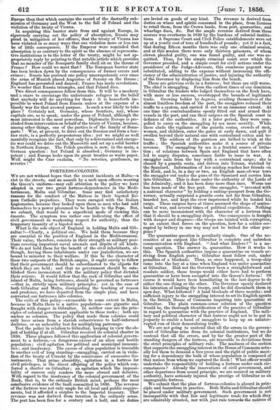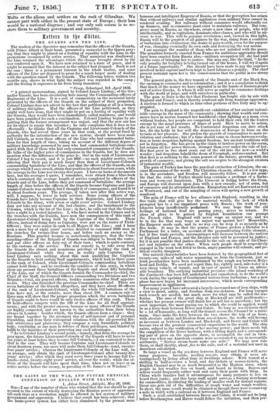FORTRESS-COLONIES.
WE are not without hopes that the recent incidents at Malta—a _licit in the streets, and an assault by a mob upon officers wearing the Queen's uniform—may call attention to the policy we have adopted in our two great fortress-dependencies in the Medi- terranean, Malta and Gibraltar. Some may find satisfactory reasons for the conduct of the Maltese in their bigoted Ro- man Catholic prejudices. They were enraged with the Italian Legionaries, because they looked upon them as men who had sold themselves to a power presumed to be hostile to the Pope. But, we submit, that would be a superficial mode of viewing this emeute. The symptom was rather one indicating the effect of civil government, in weakening respect for authority, than the temporary insanity of a bigoted mob. What us the sole object of England in holding Malta and Gib- raltar ?—Clearly, a political one. We hold them because they are essential to the position of England in the Mediterranean. Their value, therefore, consists in their strength as military posi- tions covering important naval arsenals and d€pats of all kinds. We do not hold them for the benefit of the civil inhabitants, al- though, having those inhabitants under our jurisdiction, we are bound to minister to their welfare. If this be the character of these two outposts of the British empire, it ought surely to follow that their government should be subordinated to the objects for which they are held ; and that no government should be esta- blished there inconsistent with the military policy that dictated their seizure. It would follow that the rock of Gibraltar and the island of Malta, being fortresses should be governed as fortresses —that is strictly. upon military principles : yet in the ease of both Gibraltar and Malta, disregarding the teaching of reason and prudence, we have departed from the simple plan, and have converted our fortresses into colonies.
The evils of this policy—excuseable to some extent in Malta, because in Malta there is a native population—are gigantic and fraught with danger in Gibraltar. In neither case are the prin- ciples of colonial government applicable to these rocks ; both are useless as colonies. The policy that made them colonies could only have arisen from a slavish subservience to half-informed doctrine, or an unhealthy lust for multiplying patronage. Test the policy in relation to Gibraltar, keeping in view the ob- ject of holding it at all. Gibraltar received its colonial charter in 1830. Three plagues followed this application of colonial govern- ment to a fortress,—a dangerous excess of an alien and hostile population; civil agitation for political and, municipal immuni- ties; and insolvency. The excess of alien population is traceable to another evil of long standing—smuggling, carried on in viola- $ii,on of the treaty of Utrecht by the connivance of successive Go- vernments. That prime absurdity, agitation in a fortress for civil privileges is the direct offspring of the policy which con- ferred a charter on Gibraltar ; an agitatien which the impossi- bility of success only renders the more absurd and delusive. With regard to the insolvency of the colonial government of the Rock, that is, to the ordinary British mind, perhaps the most conclusive evidence of the fault committed in 1830. The revenue of the fortress was not only ample for all local and public require- ments, but it afforded a surplus to the Imperial treasury. That revenue was not derived from taxation in the ordinary sense. The port has been free for a century and a half, and. no duties
are levied on goods of any kind. The revenue is derived from duties on wines and spirits consumed in the place, from licences to retail them, from the Crown lands, from port, quarantine' and wharfage dues, &c. But the ample revenue derived from these sources was overborne in 1830 by the burdens of colonial institu- tions. A Supreme Court and Civil Police establishments were set up at a yearly cost of tens of hundreds of pounds ; yet it is a fact, that during fifteen months there was only one criminal session, and at this session there were only thirteen prisoners, of whom eleven pleaded guilty, one was found guilty, and one was ac- quitted. Thus, for the simple criminal court over which the Governor presided, and a simple court for civil actions under the presidence of the Judge-Advocate, this cumbrous pageant was substituted, adding to the expense without increasing the effi- ciency of the administration of justice, and injuring the authority of the Governor by displacing him from the 'bench.
These are grievous evils in a fortress ; but there are still worse. The chief is smuggling. From the earliest times of our dominion in Gibraltar the traders who lodged themselves on the Rook have, with more or less success, overstepped the bounds of legitimate trade. Growing bolder by degrees, availing themselves of the almost limitless freedom of the port, the smugglers reduced their traffic to a system and carried it out to an immense extent. At one time the conirabandistas openly fitted out and armed their vessels in the port, and ran their cargoes on the Spanish coast in defiance of the authorities. At a later period, they were com- pelled to carry on the smuggling by sea more secretly. While these elude the vigilance of the guards. costas, crowds of men, women, and children, enter the gates at early dawn and quit it swollen beyond their natural size with contraband cotton and to- bacco. The soldiers of the garrison are bribed to wink at the
traffic ; the Spanish authorities make it a source of pprivaterevenue. The smuggling by sea is a fruitful source of irrita- tion; of relations between Spain and England that have often led to angry disputes, sometimes liable to issue in war. A smuggler sails from the bay with a contraband cargo ; she is chased by a guarda costa, and driven into Tetuan, watched by the Spaniard. Information of her mishap reaches her friends on the Reek, and lo, in a day or two, an English man-of-war tows the smuggler out under the guns of the Spaniard and carries him into Gibraltar. This is done under the authority of the Lords of the Admiralty, and it has been done more than once. Worse use has been made of the free port. One smuggler, "invested with a national character" by holding a sailing-passport from the Go- vernor, actually surprised a guards costa not far from Gibraltar, bearded her, and kept the crew imprisoned while he landed hi.; cargo. These cargoes have at times assumed the shape of contra- band. of war, and several times of political expeditions. Nothing can be more inconsistent with the character of a fortress than that it should be a smuggling depot. One consequen-ce 4 fraught with danger and disgrace—the troops are tainted with corruption, to an extent that forces on the question, how far a soldier cor- rupted by bribery in one way may not be bribed for other pur- , se s ?
The quarantine question is peculiarly. simple. One of the ne- cessities of an outpost like Gibraltar is complete and unbroken communication with England. "And what hinders ? " is a na- tural question. The answer is, quarantine. How it works is this. The Spanish authorities impose a quarantine on vessels ar- riving from English ports ; Gibraltar must follow suit, under penalties of a blockade. Thus, as once happened, a troop-ship came into the bay at a time when Fngland was under quarantine at Gibraltar. Had not the Governor been a straightforward and resolute soldier, those troops would either have had to perform quarantine or have been smuggled into the Queen's fortress ! Of course it would. have been humiliating in the last degree to do either the one thing or the other. The Governor openly declared his intention of landing the troops, and he did disembark them in open day. What followed ? A land blockade of three months ; and sufficient injury to the smuggling interest to set its English agents in the British House of Commons inquiring into quarantine at Gibraltar. The plain common-sense solution of the question would be, the thorough identification of the practice of Gibraltar in regard to quarantine with the practice of England. The mili- tary and political character of that fortress ought not to be put in jeopardy to enable a band of smugglers to keep up an uninter- rupted run of their demoralizing traffic. We are not going to contend that all the errors in the govern- ment of Gibraltar arise from its colonial institutions, but we do contend that all the errors and by far the greater part of the standing dangers of the fortress, are traceable to deviations from the strict principles of military Lle. The madness of the section that supports the smuggling interest in the House of Commons actu- ally led them to demand a free press and the right of public meet- ing for a dependency the bulk of whose population is composed of that nation from whom we captured the Rock ! What officer would undertake the responsibility of holding a fortress under such cir- cumstances? Already the innovations of civil government, and other departures from sound principle, we are assured on military authority, have seriously injured the prestige of Gibraltar as an impregnable fortress. 'We submit that the plan of fortress-colonies is absurd in prin- ciple and hazardous in practice. Both Malta and Gibraltar should be placed under military government. Such government is not incompatible with that fair and legitimate trade for which they are admirably situated, nor with just rule towards the natives of
Malta or the aliens and settlers on the rock of Gibraltar. We cannot part with either in the present state of Europe ; their loss would be a national disgrace ; and our only safe course is to re- store them to military government and security.



































 Previous page
Previous page